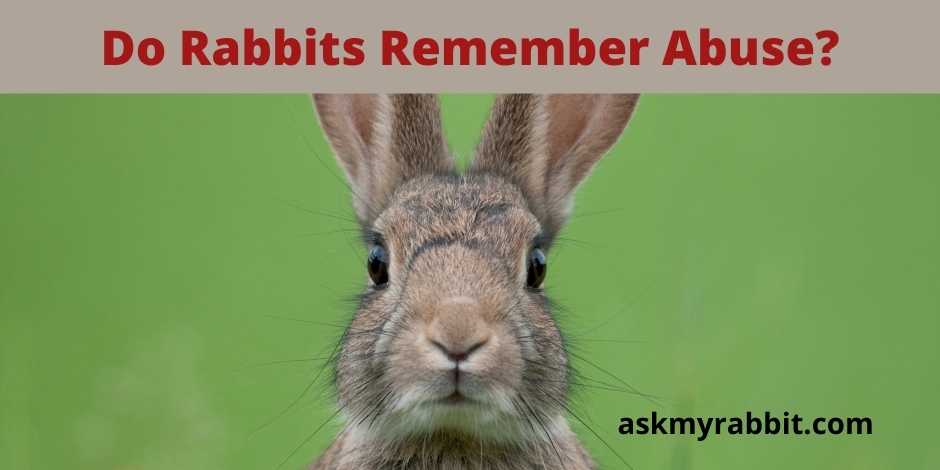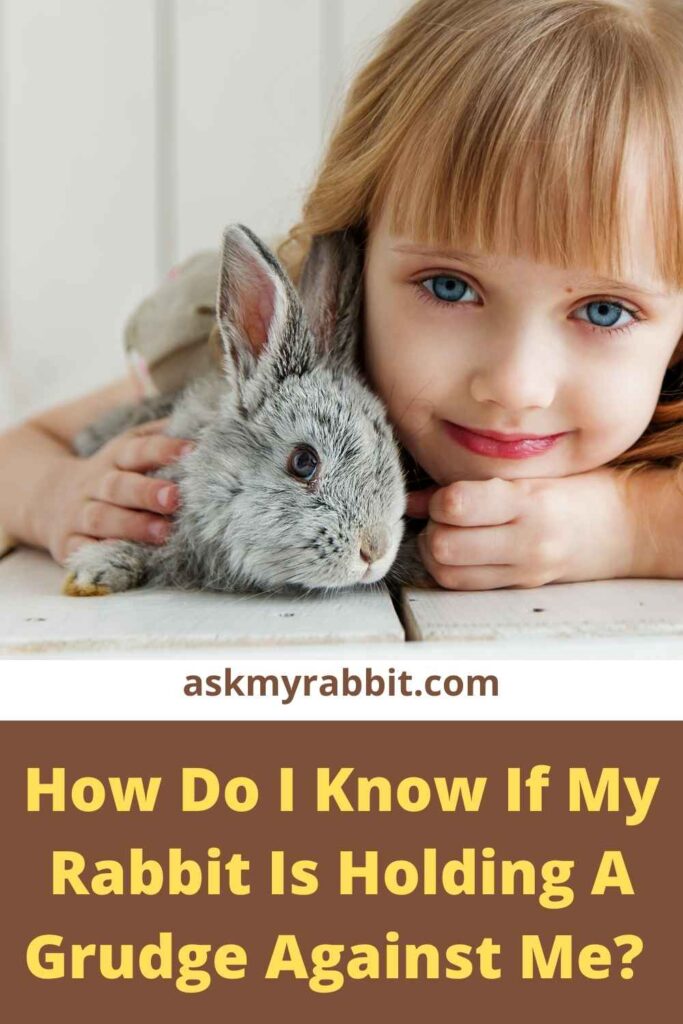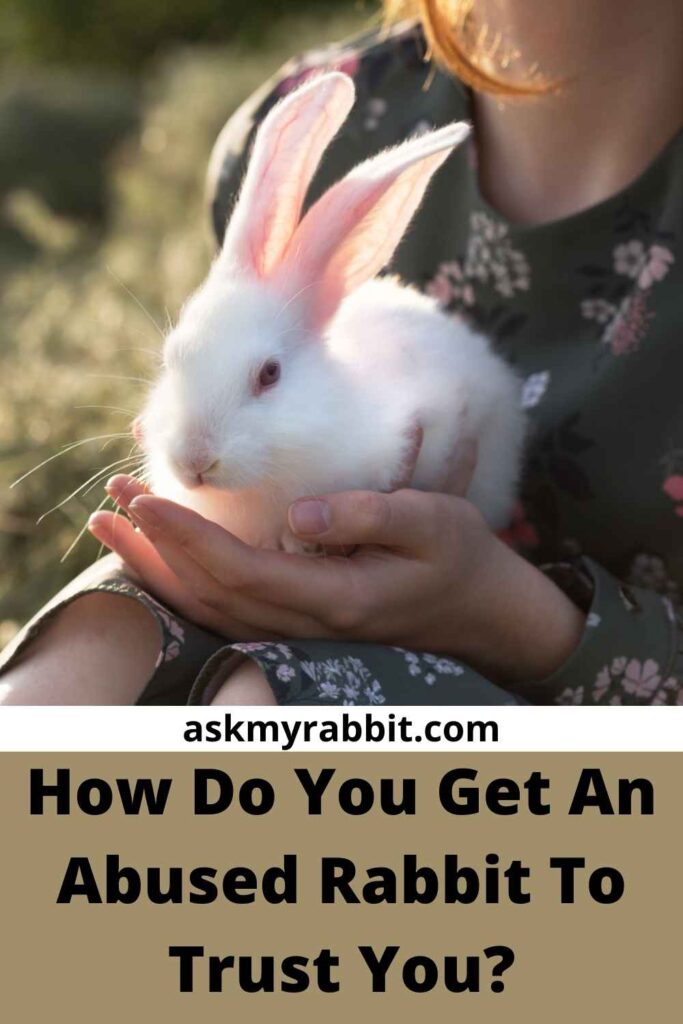When most people see a rabbit, they assume it to be a basic creature with nothing going on upstairs. If you’ve newly acquired a rabbit, you might be wondering if she’ll remember you and how excellent her memory is. You might be amazed at how well rabbits’ minds operate.
Yes, rabbits remember abuse. Your bunnies are very bright creatures. Their minds are continually whirling even when they appear to be calm.
Furthermore, while rabbits may not recall everything they did on any given day, they do recall key occurrences. This may influence how they interact with certain people.
Understanding how rabbits’ minds operate is critical for providing them with the best care, particularly the appropriate mental stimulation. In this article, we will inform you all about your bunny’s mental capabilities. So, keep reading!

Do Rabbits Hold Grudges?

Yes, rabbits do hold grudges. Rabbits have a variety of emotions that indicate they are offended. This demonstrates how important respect is to them.
If a rabbit is insulted or irritated, he will show it. A rabbit may keep a grudge for hours to days. However, this will also depend on the severity of the offence.
A gentle pat on the forehead or an apology treat will sometimes make a grumpy bunny feel better. However, if your rabbit is genuinely insulted, they can pout for a long time.
If you’ve ever done something to annoy your rabbit, you may have observed that they behave strangely as a result. They’re no longer the warm and caring bunny you’ve come to expect.
Instead, they will entirely avoid you and may even lash out forcefully at first. It may appear like your rabbit harbours a vendetta against you.
Rabbits are prone to becoming upset and harboring grudges against humans. When a rabbit is agitated, they will usually give you the cold shoulder and refuse to eat any goodies. Rabbits with a grudge will also flick their feet at humans.
When a rabbit gets enraged by someone, their rage usually dissipates quickly. You may quickly win back your rabbit’s affections by giving them their favorite treat or a relaxing massage. If they are slighted, though, some rabbits will harbor a grudge for several hours or even days.
How Long Does A Rabbit Hold A Grudge?
Rabbits, in general, do not keep grudges for lengthy periods of time. After you place them back on the ground or into their native region, it may just be for a few minutes.
However, some bunnies are known to shun you or give you the cold shoulder for several hours following the offensive behavior. Negative and frightening events are remembered more vividly by rabbits than good or neutral events. Your rabbit will remember if you regularly put them in stressful circumstances.
While your rabbit may have just carried a grudge for a few hours the first couple of occasions, they will gradually lose faith in you. You should take up the effort to make apologies and improve your own conduct. If you don’t do so, their behavior when they are shunning you will eventually become their long-term habit.
How Do I Know If My Rabbit Is Holding A Grudge Against Me?

Rabbit behavior might be tough to decipher at times. Some of their actions are so subtle that you won’t notice they’re angry with you.
While each rabbit may express their dissatisfaction in their own unique way, these are the most typical actions a rabbit does when he is holding a grudge against you:
1. Cold Shoulder
If they feel cheated, rabbits will give you the cold shoulder on a frequent basis. This is when the rabbit jumps just out of reach and completely ignores you. They may cast a glance behind them to ensure that you are aware of their presence. Your bunny is angry with you and wants you to know it.
If you approach your rabbit to pat him or her, they will just hop away and sit with their butt facing you. Your rabbit is sulking at this time and isn’t ready for an apology. You can try petting them again once they’ve calmed down to see if they’ll take a massage.
2. Flick Their Feet At You
Flicking the feet is an indisputable indicator that your bunny is enraged by anything you’ve done and is yelling at you.
When you first put your rabbit down after holding them, you will observe this behavior. They’ll jump away from you, their feet flicking as they do so. They’ll probably give you the cold shoulder for a bit after that, until they’re ready to forgive you.
3. Refusing Treats
Some rabbits will express their resentment by refusing to accept treats or anything from your hand. Your rabbit will ignore it until they are ready to forgive you.
Surprisingly, this is rarely accompanied by a general unwillingness to eat. Rabbits who are enraged will usually continue to eat their hay and regular food. However, whatever you try to feed them will be denied.
4. Temporary Aggressive Behavior
When they bear a grudge, some rabbits become enraged. When you approach them, they will swipe at you or try to bite you instead of merely hopping away. They may even approach you and give you a hard nip to express their displeasure with your behavior.
This violent behavior is merely transient and does not indicate a lasting personality change in your rabbit. If you allow your rabbit some breathing room, they will ultimately forgive you.
5. Urinating
Rabbits are sophisticated creatures who understand where they should go to the restroom. If they’re angry with you, they could urinate somewhere they wouldn’t ordinarily urinate.
Rabbits strive to assert control and ownership of an area by urinating and spreading their smell. Your rabbit is letting you know that they are the boss and that they are dissatisfied with your behavior by peeing outside of their litterbox.
This is especially true if your rabbit has a vendetta against you since you cleaned their territory. Because you made their scent go from their domain, your rabbit will make sure to reintroduce it in a way that you won’t miss.
Do Rabbits Remember If You Hurt Them?
Yes, rabbits do remember if you hurt them. Rabbits do, in fact, have excellent memory. They have an excellent recall for both place and emotions. A rabbit’s feelings are frequently based on an event they recall occurring.
Rabbits are also adept at recalling situations that elicit an emotional reaction. For example, if you accidently tread on your rabbit, they would most likely remember the incident for a long time and be wary of you.
In a rabbit’s mind, being trodden on simulates being attacked by a predator, therefore if their owner walked on them, even accidently, a wave of panic would sweep over them that they would not quickly forget.
A rabbit that was formerly sociable becomes protective and hostile as a result of an accident like this. This rabbit may feel compelled to be protective until the mishap is no longer fresh in his mind.
How Can You Tell If A Bunny Has Been Abused?
Rabbits react to abuse and stress in a variety of ways. It’s critical that you’re able to spot any changes in your rabbit’s behaviour. When rabbits are threatened, they will usually flee to a calm and concealed spot. This is natural behaviour, but it should be taken seriously if it occurs on a regular basis.
You should be able to spot your rabbit’s indications of abuse. Stress can manifest itself in a variety of ways, including:
- Showing signs of anxiety (freezing, hunched up with ears flat against the body)
- Extreme jitteriness and vigilance
- Being aggressive to people or other rabbits, especially if the behaviour is unusual
- Being restless
- Being very inactive
- Hiding or trying to run away
- Over-grooming
If you see any of these indicators of stress, call your veterinarian right away. Your veterinarian will be able to help you decide what is the best course of action.
How Do You Get An Abused Rabbit To Trust You?

In order to get your abused rabbit to trust you again, follow these steps:
1. Softly Speak
It’s critical that you treat your new rabbit carefully as it adjusts to its new surroundings. Rabbits have a keen sense of hearing by nature. If you don’t want your rabbit to flee, keep your voice low and quiet when you’re around it.
Many bunny owners have stated that their rabbits reacted positively to your chatting to them by hopping up, purring, and licking their hands.
It’s also worth noting that rabbits are highly sensitive creatures that can frequently sense how we, as humans, are feeling. This implies that if you speak in a loud, furious tone, you will most likely terrify and scare them away.
If you’re having friends around (or any other noisy event at your place), keep the rabbit away from humans so it doesn’t feel terrified or overwhelmed by the sound of their voices.
2. Small Treats
Classical conditioning is a learning strategy that entails instruction by association. Ivan Pavlov’s work in classical conditioning has been a significant scientific achievement in teaching us more about how stimuli cause certain reactions, and you can simply apply his findings to your rabbit!
When you give your rabbit little treats every time you positively engage with them, they will begin to associate you with something they enjoy (their tasty snacks!).
Simply explained, providing a rabbit with modest gifts over time will lead to a sense of trust. It’s true that the road to your bunny’s heart is through its stomach!
3. Allow Your Bunny To Approach You
One thing that every pet owner should keep in mind is that you should never impose your attention on your rabbit, or any other animal for that matter. If you try to push your affection on your pets, they may get upset and irritated.
Being present and patient with your rabbit is the greatest approach to acquaint them with you as their new owner. Bunnies are naturally curious creatures, and if you sit in an enclosed space with them and wait long enough, your rabbit will most likely come to you without urging.
In fact, if you’re comfortable laying down in a room with your rabbit, they’ll frequently leap over you and investigate their environment. That is a true act of trust for a prey species like a rabbit.
4. Holding Your Bunny Correctly
It’s natural for rabbit owners to desire to hold their pets. However, we must recognise that it isn’t always in their best interests, and it won’t help them begin to trust you.
Prior to being domesticated, rabbits were ground-dwelling creatures whose primary predators were birds. Unfortunately, this implies that when babies are carried or handled, their immediate instinct is to be afraid.
Instead of raising your rabbit, try hugging, caressing, patting, and stroking them, or simply being there with them. Bunnies are gregarious creatures who love being around other people, albeit some enjoy it more than others. If you’re not sure whether your rabbit appreciates your company, keep an eye out.
5. Consistency
This adage is true in many areas of life, but none more so than when it comes to convincing your rabbit to trust you. You will grow accustomed with your freshly acquired pet if you play and cuddle with it every day, and the rabbit will begin to recognize and trust you.
On the other hand, if you don’t see your rabbit regularly and simply play with them once in a while, the bunny will become more wild and distrustful of you.
As a result, it’s critical to maintain everyday touch with your rabbit. In fact, if you don’t spend enough time with your rabbit, you should acquire them another rabbit to keep them company.
6. Identify Your Bunny’s Characteristics
Each rabbit, like people, has an own personality with different characteristics. Knowing your rabbit’s personality will help you determine the best technique for making him or her feel comfortable and capable of trusting you.
When it comes to rabbits, there are six primary personality kinds, in my opinion. There is, of course, some overlap between each personality type.
It will be easier to get outgoing rabbits to adjust to new situations, and it will take less work to gain their trust. Funny rabbits enjoy being the centre of attention and will engage in games with you. If your rabbit accomplishes these things, it’s likely that they already have faith in you.
When you approach shy bunnies, they will be more frightened. Because fearful rabbits will flee from you, you’ll need to use a kinder approach to gain their trust.
Instead of approaching your rabbit, place a strong focus on being patient with it. Rabbits that appear to be withdrawn, that is, rabbits who do not act naturally. Before you even consider how to gain their trust, you’ll need to get them to a veterinarian.
Aggressive rabbits make hostile gestures against you and other rabbits. Because hormones are typically to blame for aggressive behaviour, you’ll find that connecting your bunny with other bunnies can help.
7. Optimal Living Conditions
When it comes to earning your bunny’s trust, providing a roomy and comfortable living environment is a must. Because of the small and crowded conditions, your rabbit, won’t be able to run and bounce about as much as they should.
They may get violent or retreat as a result of this. Always give your rabbit plenty of room, even if it’s only during the day. They’re confined to smaller spaces at night.
8. Have Fun with Your Bunny
Bunnies, as previously said, are incredibly friendly creatures who like being played with. Petting and caressing are excellent ways to express your love and affection for your rabbit. Giving your rabbit a little something to play with, on the other hand, will make them the happy they can be.
How Do You Bond With An Abused Rabbit?
It’s also important to know how to approach your abused rabbit while caressing them or showing them attention in any other way. Never approach your pet unexpectedly or from behind. Both of these activities worry rabbits because they remind them of predators.
When handling a rabbit, keep your movements gradual and let the rabbit see what you’re doing at all times. Avoid their blind zones, which are located just in front of their nose, behind their ears, and beneath their chin.
It’s also crucial to pay attention for indicators that your rabbit is ready to be left alone. If the rabbit is snarling or grunting, it is strongly advised that you take a break. If you continue to communicate with them, this is an indication that they are overwhelmed or furious.
Sitting with your rabbit as they play is a positive interaction. Follow signs that indicate you what your pet needs from you. If your rabbit is flopping down in front of you, or licking you, it is probable that they are seeking affection.
All of these behaviours indicate that your pet is content with your presence. If your rabbit allows you to stroke them while softly grinding their teeth, it’s an indication that they’re really happy and enjoying themselves.
Reading your rabbit’s cues and indicators, as well as appreciating their personality, will result in pleasant rather than negative or terrified memories toward you.
Frequently Asked Questions
Do Bunnies Forgive Their Owners?
Many bunnies will only keep a grudge against you until you apologize. Your rabbit will forgive you in no time if you take the time to apologize.
Do Rabbits Know When You’re Mad At Them?
If you approach a rabbit while you’re angry, agitated, or sad, they’ll sense it. This, in turn, will discourage a rabbit from interacting with you. You must earn their trust in more subtle ways.
How Do You Tell Your Rabbit You’re Sorry?
To make amends with your rabbit, sit or lie down at their level. Then feed your bunny some of their favorite treats from the palm of your hand. If your rabbit is terrified or agitated, don’t try to touch or engage with them.
Final Words
Rabbits are extremely intelligent creatures. While many people are unaware of this, they will memorise certain facts.
The basic impulse of a rabbit is to survive. Therefore, if it has a terrible encounter with a person or in a certain area, it will remember it and attempt to avoid it in the future.
Rabbits, on the other hand, have a good long-term memory, making them perfect pets to teach. They’ll learn their names, tricks, and develop a particular link with their owners.
If you have any other queries regarding your bunny’s peculiar habits, drop them in the comment section below. We will answer them soon!






